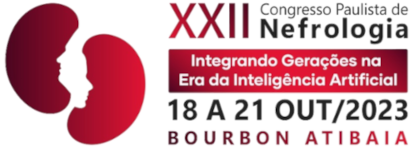Dados do Trabalho
Título
OBESITY AGGRAVATES ISCHEMIA–REPERFUSION INJURY (IRI)-INDUCED ACUTE KIDNEY INJURY (AKI) IN MICE
Introdução
Obesity, which is becoming increasingly common worldwide, is known to be associated with cardiovascular disease and progression of chronic kidney disease, due to inappropriate activation of the renin-angiotensin system. Many angiotensin II effects are dependent on AT1 stimulation of reactive oxygen species (ROS). In COVID-19 patients, overweight and obesity are associated with acute respiratory distress syndrome and AKI. Although obesity increases oxidative stress, endothelial dysfunction and inflammation, its effect on IRI-induced AKI is unknown. We hypothesized that obesity would aggravate renal IRI in mice.
Material e Método
We fed mice a high-fat or standard diet (45 and 10 kcal% fat, respectively) for 8 weeks. Some then underwent bilateral 30-min clamping of the kidney hila and subsequent reperfusion (groups: obese, normal, obese+IRI and normal+IRI). All studies were performed 48 h after IRI. Data are mean±SEM.
Resultados
Body weight (g) was 33±1.7, 32±0.7, 27±1.4 and 26±0.9 g in the obese, obese+IRI, normal and normal+IRI groups, respectively (P<0.001). Mortality was 42% and 25% in the obese+IRI and normal+IRI groups, respectively (P <0.05); there were no deaths in the non-IRI groups. Serum glucose and cholesterol did not differ among the groups. Urine osmolality was lower (1084±156 mOsm/kg) in the Obese+IRI group compared to Normal and Obese group (1669±625 and 2648±173, respectivelty, p<0.05). Urinary TBARS was 1145+158 in Obese+IRI group vs. 530+113 in Normal group (p<0.05). Tubular injury score was higher in Obese+IRI group compared to Normal+IRI group (1,5±0.62 vs. vs. 0.35±0.26, p<0.05). Creatinine clearance (mL/min/100g BW) was 0.20±0.05 and 0.20±0.07 in the obese+IRI and normal+IRI groups, respectively, vs. 0.34±0.06 and 0.40±0.08 in the obese and normal groups, respectively in the obese and normal groups, respectively. Renal p65 protein expression (%) was 127±4.8 in the obese+IRI group, vs. 100±4.1, 92.5±4.8 and 107±3.7, respectively, in the normal, obese and normal+IRI groups (P<0.05). Renal caspase protein expression (%) was higher in the Obese+IRI group (183±14) compared to all other groups (90±4.5, normal; 116±5.6, Obese; 144±14, Normal+IRI; p<0,05).
Discussão e Conclusões
In obese individuals with AKI, ROS could be a therapeutic target (FAPESP, NWO).
Palavras Chave
Acute Kidney Injury; Obesity; Inflammation; Oxidative stress; Klotho proteins; Lipocalin-2.
Área
Ciências básicas
Instituições
Faculdade de Medicina da Universidadee de São Paulo - São Paulo - Brasil
Autores
IGOR OLIVEIRA DA SILVA, NICOLE KAWAKAMI DE MENEZES, HELOISA DE OLIVEIRA JACOBINA, ANTONIO CARLOS PARRA, FELIPE LIMA DE SOUZA, LETICIA URBANO DE CASTRO, JORIS ROELOFS, ALESSANDRA TAMMARO, SAMIRAH ABREU GOMES, TALITA ROJAS SANCHES, LUCIA DA CONCEIÇÃO ANDRADE
